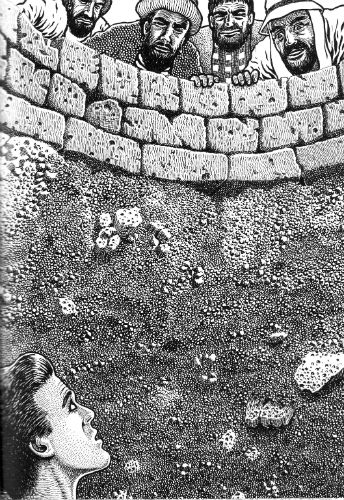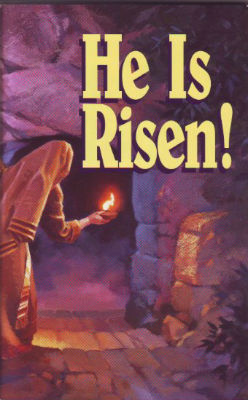 Joseph is mentioned in Psalms as someone who could have seen no way out of the Pit – without God.
Joseph is mentioned in Psalms as someone who could have seen no way out of the Pit – without God.By Neil Earle
Martin Luther called the Book of Psalms, “God’s good word addressed to God’s faithful people” – none of whom were Christians. John Calvin said the 150 psalms are “an anatomy of the soul.”
This was the part of the Bible Jesus quoted from the most. Such outpourings as “My God my God why have you forsaken me?” obviously meant a lot to him in the last hours of his human existence (Psalm 22:1). So it is only fitting to consider the message of these varied and diverse songs for us today.
We’ll borrow insights from Walter Brueggemann whom some consider the foremost Old Testament theologian writing today. The Psalms articulate the entire gamut of our lives under the Rule of God, from outbursts of guilt and even rage at God, to lashing out at the darkness of our lives, it seems nothing is out of bounds in this marvelous hymnbook of humanity.
The sheer honesty and desperate vigor of many psalms remind us that nothing is out of bounds in our dialogue with God, everything is not polite and orderly, and that the darkness must be embraced. Indeed, says Brueggemann, it is in the darkness that new life is nurtured and born just like the new life that stirs in the mother's womb as intimated in Psalm 139:15-16.
In the psalms we see how the joys and complaints of life are brought to speech. It is important that all our feelings about and toward God be articulated, argues Brueggemann, whether good or bad. This amounts to a deeper honesty in our relationship with God. For truly, all the many voices in this Hymn Book of ancient Israel inexorably blend together into a compendium of praise pointing to Yahweh the Lord God of Israel who consistently appears in the 150 chapters as majestic, faithful and compassionate.
The psalms have spoken to people in need of inner healing more deeply than possible any part of the Bible. Such dark emotions as blood-curdling revenge and cursing of enemies teach us to keep "praying through our hurts" even when God seems silent and distant.
What do we mean?
 Joseph is mentioned in Psalms as someone who could have seen no way out of the Pit – without God.
Joseph is mentioned in Psalms as someone who could have seen no way out of the Pit – without God.Well, let's look at Psalm 88, supposedly the darkest psalm in the series.
A scholar named Weiser said Psalm 88 “was unrelieved by a ray of hope” Psalm 88’s last word is “darkness’ and that should tip us off. The first verse is troubled and impassionate: “Lord God my savior, I cry out all day and at night I come before you, hear my prayer, and listen to my cry for help!” (Today’s English version).
This is followed in verses 3 to 9 with a volley of complaints and laments and protest among which God is blamed for the apparent infectious and deadly sickness the psalmist is confessing. Verse 9 says: “You anger lies heavy on me and I am crushed beneath its waves.” The laments show the praying person feeling like he is already thrown into the depths of the tomb, he is repulsive to his friends.
I am reminded how Eugene Peterson was counseling a young man who had strayed far from all right conduct and Peterson asked him to read the psalms.
“Oh I could never be as good as those guys,” the young man said.
Peterson replied, “Obviously, you’ve never read them.”
Let’s skip verses 10-12 right now which is the redemptive grace note in the song. Verses 13-18 repeat the theme of defeat, death, depression and dejection. “Why do you reject me? “I am worn out from the burden of your punishments”. “You have made even my closest friends abandon me.”
This is pretty rough and even unexpected stuff to come from the same book that proclaims “The Lord is my Shepherd” and “Your loving kindness is better than life.”
 Psalm 88's grim questions were answered in a spectacular way through Jesus' resurrection.
Psalm 88's grim questions were answered in a spectacular way through Jesus' resurrection.That is because Psalms often expresses raw reality. The one thing we can say about the sufferer in Psalm 88 is that he keeps on praying. Jesus prayed till his sweat poured out like drops of blood when facing the agony of the cross. It is through much tribulation we enter the Kingdom of God. And in the midst of overwhelming defeat and depression we keep praying until we find the way out, or learn that there is no easy answer, and thus we go on to learn deeper lessons in our life with God.
This is the reason for verses 10-12 which are six rhetorical questions placed there to show what the real intent of the song really was. Rhetoric is the word to describe how we communicate in an interesting way and most psalms have it in spades:
“Do you perform miracles for the dead? Do they rise up and praise you? Is your constant love spoken of in the grave? Or your faithfulness in the land of destruction? Are your miracles seen in that place of darkness or your goodness in the land of forgetfulness?”
These are powerful questions. No wonder these words and others like them speak so powerfully to prisoners on death row, to people dying of deadly diseases. And slowly as Christians read these words they begin to see an answer crystallizing out of the darkness.
Yes – God does perform miracles for the dead. Ask Lazarus of Bethany whom Jesus raised after being dead for four days. “Do they rise up and praise you?” Yes. Ask the parents of the little girl Jesus healed in Luke 8:40-56 or the church member named Dorcas who was raised at the request of Peter (Acts 9:36-43).
In the midst of the darkest Psalm in the Bible, when faced with the silence of God, the answers that will build and renew faith leak through – even if in the negative minor key. Americans sing a national anthem that asks rhetorical questions – Does that star spangled banner still wave? And the implied answer is obviously, Yes. Does it still wave over the land of the free and the home of the brave? Yes. Undoubtedly.
 God never seem more present than when we seek him fervently in prayer.
God never seem more present than when we seek him fervently in prayer.So we see how poets and singers use provocative rhetorical tools to point out a path of deliverance through the land of forgetfulness. It is through the resurrection that Jesus has conquered death. He went through death and came out the other side. And just as the author of Psalm 22:1 never imagined his cry of despair would come to the lips of the dying Jesus at Calvary, so the author of Psalm 88 never knew his tough, harsh questions to God would be answered. As fearsome as it is to us humans, even death is not the worse thing that agitates us when in the depths. The worst thing is being in the depths with no God to call out to.
It would seem that Psalm 88 challenges us to keep on praying. Like the unjust judge parable Jesus gave, we must persevere in payer. Even of we do not get the answer we seek – sometimes God’s answer is No – then on our knees we eventually move on to higher ground in our relationship with God. We join our despairing cries to those cries that have gone before, knowing that our precious laments and complaints will be answered in ways we may never imagine, maybe decades later.
From the worst to the best. In 21 verses. Only life with God can bring such marvelous and life-saving surprises.